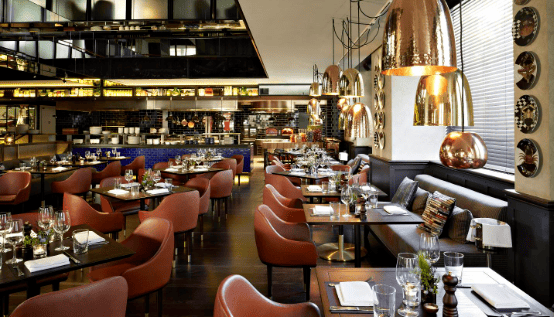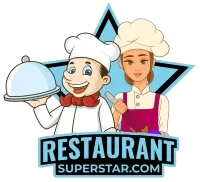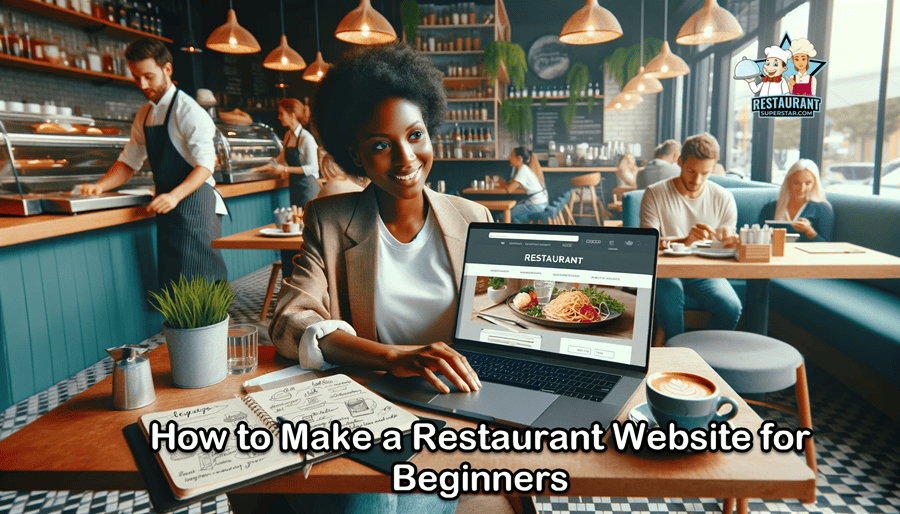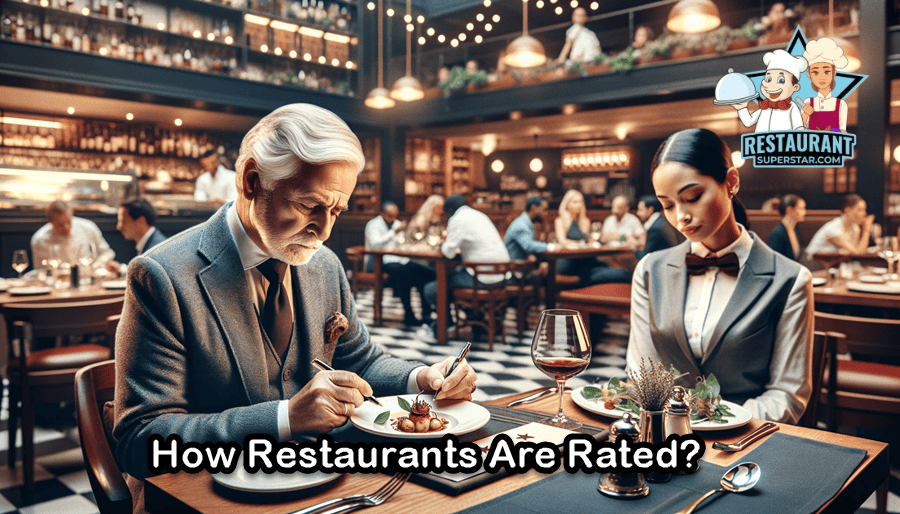How to Start a Restaurant Consulting Business

Hey there,
I’m Jeff from sunny Florida. Over the years, I’ve worn many hats in the restaurant industry, from a server hustling tables to eventually becoming a restaurant consultant.
Sharing a mojito with my friends on a balmy evening, I often get asked about my journey.
How did I transition from the dining floor to guiding other restaurant owners?
Please pull up a chair, and let’s dive into my take on how to start a restaurant consulting business.
How to Start a Restaurant Consulting Business
How to start a restaurant consulting business? Starting a restaurant consulting business involves gaining a solid foundation in hospitality, accumulating hands-on experience, building a robust industry network, understanding regional laws, and establishing a solid digital presence.
Leveraging these steps with strategic marketing and continuous learning can lead to a successful consulting career.
The restaurant world is thrilling, unpredictable, and deeply rewarding. But, just like any industry, it has its challenges.
This is where consultants like me come into the picture – providing expertise, guidance, and solutions.
If you’ve been mulling over becoming a restaurant consultant, you’re in for quite an adventure.
Why the Demand for Restaurant Consultants is Growing
In my early days, while flipping burgers and perfecting margaritas, I noticed a trend – restaurants often faced similar challenges, be it staff management, updating menus, or customer retention.
The changing dynamics in the food industry and an increasingly discerning clientele have made the restaurant business more complex than ever.
Here’s why I believe our role is becoming indispensable:
- Evolving Consumer Preferences: Today’s diners aren’t just looking for a meal and an experience. With dietary preferences, sustainability concerns, and cultural influences reshaping menus, restaurants often need a guiding hand to navigate these waters.
- Digital Revolution: Advancements in technology and the digital landscape have revolutionized the restaurant industry. From reservation apps to online reviews, navigating this digital maze can be crucial to success. Having someone who comprehends this intricate digital world can indeed be a game-changer.
- Tighter Margins: With costs soaring and competition fierce, optimizing operations to squeeze out profits requires a meticulous approach, something consultants specialize in.
- Diverse Culinary Landscapes: Florida, with its melting pot of cultures, has seen an explosion in themed and niche restaurants. Getting the right mix of authenticity and appeal can be tricky, and that’s where expert guidance comes in.
Understanding the Role of a Restaurant Consultant

When friends ask about my job, they often picture Gordon Ramsay in ‘Kitchen Nightmares.’ And while I do love a good dramatic kitchen makeover, being a restaurant consultant goes beyond that.
Here’s a glimpse into my world:
- Menu Development: Remember that vegan alligator taco that became a rage in Miami? Crafting unique, palate-pleasing menus is a part of my weekly routine.
- Operational Efficiency: Whether streamlining the supply chain or optimizing the seating layout, these behind-the-scenes tweaks can make or break a restaurant’s success.
- Staff Training: An impeccable dish can fall flat with poor service. I’ve conducted countless training sessions, ensuring staff understands the ethos of the place and delivers consistently.
- Branding and Marketing: In a world of Instagrammable moments, helping restaurants build their brand identity and market it effectively is a crucial aspect of what I do.
Starting a restaurant consulting business is about understanding the ever-changing rhythms of the restaurant world and being that guiding compass for owners looking to make their mark.
So, suppose you’re a restaurant owner in Florida (or anywhere), wondering how to level up or need advice over a cup of Cuban coffee. In that case, you know where to find me.
The Foundation of a Restaurant Consulting Business
Starting a restaurant consulting business is like building a house. With a solid foundation, the entire structure might stay intact. Let’s set that foundation right, brick by brick.
The Importance of Hospitality Education
When venturing into restaurant consulting, having a solid educational foundation is invaluable.
It offers a comprehensive perspective of the restaurant industry, encompassing everything from culinary to financial profitability.
Education goes beyond distinguishing cordon bleu from blue cheese; it entails grasping the industry’s dynamics and trends.
Degrees and Qualifications That Provide a Competitive Edge
During my time at Florida State University (Go Noles!), I saw firsthand the power of a good hospitality program. It gives you:
- Technical Mastery: Getting a degree in hospitality or culinary arts lays down the foundational knowledge of food service, including the intricacies of food safety and presentation.
- Business Acumen: Programs often cover the nuances of financial management, helping you understand the nitty-gritty of profit margins, cash flow, and cost control. This is vital, my friend, especially when you’re guiding restaurants on maximizing their returns.
- Soft Skills Training: From managing a heated situation in the kitchen to negotiating with suppliers, interpersonal skills are critical. Trust me, they’re as important as knowing your wines!
- Marketing Insight: In this age of digital dominance, being savvy with marketing, especially on platforms like Instagram, is a huge boon. Knowing how to leverage these platforms for a restaurant’s benefit? Gold.
Key Knowledge Areas: Food Safety, Financial Competency, Marketing, and Interpersonal Skills
Diving deeper:
- Food Safety: The bedrock of any restaurant. Understanding the intricacies of restaurant food storage, preparation, and presentation ensures that diners enjoy their meal and leave with a positive impression (without any health issues!).
- Financial Competency: It’s about more than just the money from sales. It’s about budgeting, managing expenses, understanding taxes, and forecasting. It’s the art of ensuring that the numbers add up to a profit at the end of the day.
- Marketing: In our digital age, a restaurant’s online presence can make or break it. From managing reviews on Yelp to creating drool-worthy posts on Instagram, it’s about building a brand and a loyal community around it.
- Interpersonal Skills: My fellow food lovers, this is the secret sauce. Managing a team, liaising with suppliers, handling customer complaints, or simply networking at industry events all boils down to building relationships.
Carving a niche in the restaurant consulting landscape is not just about passion for food (though, of course, that helps!).
It’s a blend of academic insight, hands-on experience, and the soft skills to bring it all together.
Remember, as a consultant, you’re not just a guide but a beacon of hope for many restaurants.
Gaining Practical Experience in the Field
While classrooms have merits, specific lessons can only be learned through firsthand experience.
The restaurant industry, in particular, exudes vibrancy and dynamism, where practical encounters often diverge significantly from theoretical concepts.
This exploration delves into the advantages of real-world restaurant experience and emphasizes the significance of diversifying your roles.
The Value of Real-world Restaurant Experience
A degree in hospitality or culinary arts can arm you with foundational knowledge. Still, the nuances of managing a restaurant can only be fully grasped when you’re in the thick of it.
Here’s why real-world experience is invaluable:
- Decision-making in real-time: In a restaurant, there are countless decisions to be made at every moment – from handling staff shortages to dealing with demanding customers. Being on the ground teaches you to think on your feet and make efficient decisions, essential skills for a consultant.
- Understanding Customer Behavior: Textbooks can offer demographic studies and consumer behavior theories. Still, the reality of customer preferences, their feedback, and the challenges of ensuring customer satisfaction can only be understood firsthand.
- Operational Challenges: Restaurants face daily operational challenges, from inventory management to food safety. Being involved in the day-to-day running offers insights into how these challenges can be addressed effectively.
Diversifying Roles to Understand the Multifaceted Nature of Restaurants
The restaurant business is about more than just good food. It’s about ambiance, customer service, financial management, marketing, and more.
To truly understand the business, one needs to diversify their roles and experiences:
- Front of the House vs. Back of the House: Experience both sides. Understand the kitchen’s workings the pressure of getting orders out, and simultaneously appreciate the challenges of managing tables, ensuring customer satisfaction, and handling feedback at the front.
- Different Restaurant Formats: From fast-food chains to fine dining, the challenges and demands of each format are unique. Spending time in different types of establishments can provide a well-rounded perspective.
- From Entry-Level to Management: Starting at an entry-level position and working up to management allows you to appreciate the roles and challenges at every level. This can be instrumental in building empathy and effective communication when you transition into consulting.
Gaining practical experience in diverse roles is not just a rite of passage; it’s an essential stepping stone for anyone looking to consult in the restaurant business.
Only when you’ve “been there and done that” can you truly understand your client’s needs, challenges, and aspirations.
And in the world of restaurant consulting, such insights can be the difference between offering generic advice and providing actionable, impactful strategies.
Why Building a Network Matters

Building meaningful connections is crucial in every business, especially in the restaurant consulting industry.
The power of your network can make a remarkable impact, enhancing your services, streamlining your operations, and attracting a broader client base.
Get ready for an immersive exploration of networking and its vital role in launching a thriving consulting business.
The influence of solid industry contacts
The restaurant industry thrives on relationships. It’s an ecosystem where chefs, managers, suppliers, and government officials play integral roles.
In the world of consulting, the presence of a dependable network can be the determining factor between a seamlessly executed project and a logistical nightmare.
Consider the following scenarios
- Navigating Bureaucratic Hurdles: Imagine needing a specific permit or clearance for a restaurant you’re consulting for. Having a contact in the city council can expedite the process and provide insight into navigating the requirements seamlessly.
- Finding the Best Suppliers: Need fresh produce or a unique ingredient? Contact with local suppliers or farmers can provide access to premium products at a better rate.
- Leveraging Expertise: Stumped on a particular restaurant design or menu challenge? Tapping into your network might connect you with an expert who has faced and overcome a similar issue.
Tips to grow your community organically through academics and on-the-job experience
- Engage in Academic Networking: While pursuing your hospitality education, actively participate in seminars, workshops, and group projects. Engage with professors and industry guests. Join student clubs and organizations related to the hospitality field.
- Optimize On-the-Job Networking: When working in restaurants, be proactive in forming relationships. Attend industry events and conventions. If there’s an after-hours gathering or a team-building event, be there. These are opportunities not just to learn but to connect.
- Maintain and Nurture Relationships: It’s not just about creating contacts; it’s about maintaining them. Send occasional emails, share industry news, or even just a quick hello. Remember, a network isn’t a collection of business cards; it’s a web of relationships.
- Offer Value: Networking is more than a one-way street. Ensure that you’re also providing value to your contacts. Share insights, offer help, and be available when they need you.
Your network is one of your most valuable assets in the restaurant consulting business.
It provides resources, aids in problem-solving, and can consistently source new clients.
Building and nurturing this network organically through academics and job experiences is not just bright—it’s essential.
Documenting Your Professional Journey
When you decide to ride the wave and embark on the adventure of starting a restaurant consulting business, the journey, let me tell you, is as crucial as the destination.
I’ve been there, soaking up the Floridian sun, sipping on fresh orange juice, and advising numerous eateries on their way to success.
Here’s a slice of my journey and how documenting it has been crucial.
Building a Compelling Portfolio of Achievements
I’ve seen many restaurant dreams flourish into culinary paradises, and trust me, having a solid portfolio is like having a golden ticket in this industry.
Your portfolio is your storybook, showcasing your triumphs and challenges, garnished with testimonials, pictures, and the rich experience you gather.
- Show, Don’t Just Tell: Photos and visual elements are the spices of your portfolio. They convey the ambiance, the food’s essence, and the joyous smiles of satisfied customers. It’s your visual narrative of success stories and happy endings, so don’t shy away from flaunting them.
- Craft a Rich Tapestry of Reviews: Positive reviews are like the refreshing sea breezes of Florida—they uplift you. When potential clients see the excellent words spilled by satisfied restaurateurs, they’re more likely to trust your expertise and want you as their guide through the thrilling restaurant landscape.
- Content is King, Queen, and the Whole Court: Rich, engaging content serves as the meat of your portfolio. Whether it’s blogs, case studies, or snippets of your journey, the more genuine and relatable it is, the more it resonates with the restaurateurs out there looking for a beacon in the culinary storm.
Marketing the Flavorful Journey
Marketing is like seasoning. Too little, and the dish is bland; too much, and it’s overwhelming. Striking that balance is crucial.
Document your experiences, the transformations you’ve witnessed, and the culinary wonders you’ve helped create.
- Sharing is Caring: Regularly share anecdotes, insights, and nuggets of wisdom on social media. It’s not just about broadcasting your achievements but about adding value, sparking conversations, and building relationships. Share the lessons learned while helping a small-town diner become the talk of the town or the joy of seeing a family restaurant pass down through generations.
- SEO Optimization is Your Friend: Knowing the intricacies of SEO is like knowing the secret recipe to a bestselling dish. It’s what makes your story discoverable to restaurant owners fishing for insights on making their venture a hit. So, sprinkle those keywords, optimize your content, and let the world taste your story.
Embarking on how to start a restaurant consulting business is like cooking a gourmet meal.
It’s filled with challenges and delightful surprises, with each step adding a new flavor to the dish.
Documenting the journey—through vivid photographs, glowing reviews, or insightful content—is your way of letting the world savor your culinary journey, enticing them to experience it themselves.
And remember, in the vibrant and diverse culinary landscape of Florida, every story and every journey is unique, and sharing it makes the restaurant industry such a rich and fulfilling space.
Navigating the Legal Landscape of Restaurant Consulting

The hospitality industry is vast and diverse, so when considering starting a consulting business within this sector, you must be aware of and adhere to many regulations.
This is crucial not only for maintaining compliance but also for ensuring the success of your clients. Here’s why understanding the legal landscape is essential:
Understanding Varying Hospitality Laws Across Regions
The hospitality industry is governed by distinct rules and regulations in each geographical region. These guidelines dictate the practices and standards that establishments must adhere to, ensuring the best possible experience for guests.
The reasons for this include:
- Differences in local culture.
- The region’s history with the hospitality industry.
- Each region’s specific challenges and opportunities.
Why This Matters to a Consultant
When advising a restaurant, especially those looking to expand into new areas or starting, you must be deeply familiar with the local regulations.
This might include specifics about licensing, zoning restrictions, and even nuances in labor laws.
For instance, the liquor license process and requirements can vary significantly from one city or state to another.
While one area might have abundant available licenses, another might have a capped limit, making licenses costly and complex to obtain.
Suppose you’re consulting for a restaurant considering expanding to multiple states or countries.
In that case, your value will lie in your ability to guide them through each region’s unique regulatory challenges.
The Significance of Building, Health, and Safety Codes
While hospitality laws may differ across regions, their ultimate goal remains to be unaltered: ensuring customers’ and staff’s safety and well-being takes precedence.
Building, health, and safety codes are a significant part of this, and they cover a range of topics from food safety and handling to the physical infrastructure of the establishment.
Why This Matters to a Consultant
Restaurants face routine health inspections, and failure to comply can result in hefty fines, temporary closures, or even permanent shutdowns.
As a consultant, your job is to ensure that your clients always comply with these codes.
This might mean guiding them through the initial setup to ensure compliance, providing training on food safety protocols, or even assisting them in navigating the process after a failed inspection.
Furthermore, understanding the specific requirements of a building code can aid in the decision-making process when a restaurant is choosing a location or renovating.
For example, understanding the requirements for wheelchair accessibility, fire exits, and restroom facilities can influence the design and functionality of a restaurant space.
Navigating the legal landscape is more than just a necessary evil of the restaurant consulting business—it’s a pivotal component of the job.
Your understanding of and ability to navigate these regulations can be a significant selling point for your services.
After all, a restaurant’s success isn’t just about serving great food; it’s about creating a safe and compliant environment for all.
Building Your Digital and Marketing Presence
Creating a Stellar Website
When I first leaped into restaurant consulting in our lovely state of Florida, I realized the power of a digital presence.
Let me tell you, the sun and beaches weren’t the only things helping me out; my website was a game-changer.
So, if you’re thinking about how to start a restaurant consulting business, your website will be your best friend. Here’s what I’ve learned:
Essential components of a consultant’s website
- Personality: Yep, it’s Florida, and we have our flair. Infuse your site with personality. Make sure visitors get a sense of who you are and what makes you different from the rest. It’s my hands-on experience mixed with a pinch of humor and love for the industry.
- Testimonials: People want to know you’re legit. A glowing review from that beachside cafe or that snazzy downtown restaurant can make all the difference. Display these prominently!
- Visuals: Visuals speak volumes. Flaunt your projects, whether it’s a revitalized menu design or a meticulously crafted restaurant layout, you provided expertise on. Before and after shots? Oh yeah, they’re gold.
- Clear Call-to-Action: Whether it’s a “Book a Consultation” button or “Get in Touch,” make sure visitors know how to reach you.
Incorporating a blog for marketing and SEO
Trust me, I wasn’t a writer. But the importance of a blog must be stressed more. Here’s why:
- Show Your Expertise: A blog lets you discuss the latest trends, share your insights, and offer tips. For instance, a piece on “Top Food Trends in Florida 2023” or “How to Manage Seasonal Restaurant Traffic” can be helpful.
- SEO Boost: Alright, here’s the techy bit. Search engines love fresh content. A regularly updated blog with relevant keywords, like “how to start a restaurant consulting business,” will help you rank higher in search results. It’s how you get noticed.
- Engagement: Your blog can be a space where readers ask questions, where you can engage with them and build a community. It’s also a great way to keep potential clients coming back for more of your insights.
Diving into the world of restaurant consulting is thrilling. And in this digital age, a stellar website can make or break your consulting career.
So invest in it, nurture it, and watch as it brings you one step closer to your dreams. Cheers to your upcoming adventures in the culinary consulting world.
Strategic Marketing for Visibility
From my experience, one of the biggest challenges of diving into the restaurant consulting business is ensuring people know about your services.
You need to be good at what you do; you also have to ensure potential clients can find you. Let’s talk about some strategic marketing methods that I found compelling.
Digital strategies: Blogging, social media, and online business pages.
- Blogging: There’s a saying in the online world, “Content is king.” And from my journey, I’ve found this to be spot-on. Starting a blog on your website where you share insights, stories, and tips about the restaurant industry can be a game-changer. Not only does it position you as an expert in your field, but it also helps in improving your website’s SEO (search engine optimization). This means your site has a better chance of showing up when someone types in “how to start a restaurant consulting business” or related queries.
- Social Media: If you aren’t on platforms like Instagram, Facebook, or LinkedIn, you’re missing out big time. These platforms are where your clients hang out. Share behind-the-scenes shots, success stories, and tips, and engage with your audience. It builds trust and lets people know the face behind the brand.
- Online Business Pages: This is a biggie! Websites like Yelp, Google My Business, and Tripadvisor allow you to create business profiles. And when someone searches for restaurant consultants nearby, having a profile on these platforms significantly improves your visibility. Plus, the reviews here can bolster your credibility.
Low-budget yet effective marketing and SEO techniques.
- Local SEO: I can’t stress this enough. Most of your initial clientele as a restaurant consultant will be from your locality. Optimizing your website for local search results (think: “restaurant consultant in Florida”) can be incredibly beneficial.
- Guest Posting: This involves writing articles or blogs for other websites in your niche. Not only does this give you exposure to a new audience, but it also builds valuable backlinks to your website, improving its SEO.
- Engage with Local Communities: Attend local food fairs, restaurant openings, or workshops. Sometimes, the old-school method of shaking hands and exchanging business cards can lead to fruitful connections.
- Email Marketing: Building an email database and distributing newsletters or tips is a cost-effective approach to actively engaging potential clients. Offer a free e-book or a guide (like “5 Mistakes New Restaurant Owners Make”) in exchange for their email.
Starting a restaurant consulting business is a journey filled with its own set of challenges. But with the right marketing strategies, you can ensure your target audience knows you, trusts you and wants to work with you.
So, whether you’re just starting or looking to expand, remember the words of the wise: “Visibility is as important as ability.”
Starting and Building Credibility

Making the Initial Leap
I’ve ridden the restaurant roller coaster for quite a while now, and one thing’s for sure: diving into a restaurant consulting business isn’t a walk in the park, especially when you’re new to it. But the thrill?
Worth it. Let me share my two cents on approaching the market when you’re a newcomer.
How to approach the market when you’re a newcomer.
- Local Research: Begin in your backyard. Florida, for instance, has a vibrant culinary scene thanks to its melting pot of cultures. Familiarize yourself with local restaurant trends and understand what’s working and what’s not. Dive into local publications food blogs, and attend food festivals. The key is to be in the know.
- Value Proposition: Think about what sets you apart. It could be your unique approach to blending traditional and contemporary cuisines or your expertise in sustainable restaurant practices. Make this your selling point.
- Stay Authentic: Folks can smell pretense from a mile away. Be genuine in your engagements. Share personal experiences, mistakes, and lessons learned. It’ll resonate more with budding restaurateurs.
- Networking: Attend local seminars, workshops, and food and wine festivals. Mix and mingle. How many opportunities might arise from a casual chat at the bar?
- The strategy of starting small and focusing on relationship building.
- Baby Steps: You don’t have to go all out from day one. Start by offering consultancy for smaller, family-owned restaurants or pop-ups. It allows you to understand the nuances of the business without being overwhelmed.
- Build Trust: Remember, it’s a person’s dream you’re dealing with. Be a good listener. Understand their vision and align your strategies accordingly. It’s not just about implementing a strategy; it’s about ensuring it aligns with the restaurateur’s dream.
- Value Relationships over Contracts: This might sound cliché, but I can’t stress it enough. It’s not just about sealing a deal. It’s about forming a bond. Happy clients are your best marketers. They’ll sing your praises louder than any ad campaign ever could.
- Keep Learning: The restaurant industry, especially in Florida, constantly evolves. Keep up with the latest culinary trends, whether tech innovations or food trends. The more you know, the more you grow.
By now, you’re probably thinking, “Alright, Jeff, easier said than done.” And you’re not wrong.
But remember, every big name in the restaurant consulting business started right where you are now.
You can make your mark with passion, persistence, and some Florida sunshine (okay, the sunshine’s optional).
Harnessing the Power of Reviews and References
Throughout my journey, I have realized the tremendous influence of reviews and references, particularly in this highly competitive and captivating state.
These invaluable tools hold the key to unlocking success when embarking on the endeavor of starting a restaurant consulting business.
So, let us delve into why they are nothing short of a golden ticket.
Online Reviews: The Silent Salesman
As a resident of Florida, when I seek new dining or leisure destinations, I visit Google to peruse its reviews.
I am not alone; it has become commonplace for many individuals in the present era. Let me reveal the reasons why online reviews have revolutionized the game:
- Instant Credibility: A positive review can instantly boost your reputation. People trust other people’s experiences. It’s human nature.
- Free Advertising: These reviews often highlight the best of what you offer. Think about it; they’re mini testimonials, and you didn’t have to pay a dime.
- Constructive Feedback: Not all reviews will be roses and sunshine. Some may point out areas for improvement. While it stings, it’s also invaluable intel that helps you improve your game.
- Boosts SEO: Believe it or not, good reviews can boost your website’s SEO. Search engines love businesses that get positive feedback. It’s all part of delivering the best answers (or, in this case, services) to users.
Case Studies: Your Personal Showroom
While online reviews are your silent salesmen, consider case studies your showroom.
They are detailed stories of projects you’ve undertaken, showing potential clients exactly what you can do.
Here’s how to make the most of them:
- Be Detailed: Dive deep. Explain the client’s problem, your strategy, the action steps, and the results. Be sure to sprinkle in some complex numbers – percentages, dollar amounts – they can be very persuasive.
- Show Off Your Range: Got a case study where you helped revamp a menu for a seafood joint? Great. How about that time you helped a café optimize its layout for faster service? That should be in there, too. The more diverse your case studies, the better.
- Pictures, Pictures, Pictures: A before and after photo can speak a thousand words. If you have them, flaunt them.
- Client Testimonials: The case study includes a direct quote from the client. This adds authenticity and an emotional touch.
I’ve been in the restaurant consulting business long enough to know that while skills and expertise are crucial, so is the art of showcasing them. In the digital age, reviews and case studies are potent tools.
Remember, if you’ve delivered excellent service, don’t hesitate to ask your clients for a review or a testimonial. Most are happy to oblige, especially if they see value in your offer.
Overcoming the ‘No Experience’ Hurdle in Restaurant Consulting

Living in sunny Florida, I’ve had my fair share of seafood dinners, roadside grill experiences, and tiki bar escapades.
But you know what?
Here’s the thing I’ve learned from my journey through the restaurant industry: starting fresh in any new venture, especially one like restaurant consulting, is like going on a wild rollercoaster ride.
Trust me, it’s been quite the journey. Having transitioned into the consulting world, I’d love to share how I overcame the “no experience” barrier.
So, are you ready? Let’s dive right in.
Starting from Scratch: Identifying Niches and Developing a Business Plan
Before I made my mark in the world of restaurant consulting, I was just a food lover with a knack for understanding restaurant dynamics.
The first step to breaking into the business was recognizing my unique strengths and identifying specific niches where I could shine.
Here’s my two cents on how you can get started:
- Identify Your Strengths: Whether you’re a culinary whiz, a marketing maven, or have a keen sense for interiors, hone in on what makes you unique.
- Find Your Niche: With restaurants varying from fast-casual joints to upscale fine dining, pick a segment you’re passionate about. For me? Seafood shacks and grills!
- Draft a Business Plan: It’s not just about crunching numbers. Think about your unique selling propositions, target audience, and marketing strategies.
The Role of Certification in Establishing Expertise and Credibility
Look, I get it. Not having a fancy degree or decades of experience can feel like a weight around your ankles.
But remember, expertise isn’t just about time; it’s about depth. I decided to go down the certification route to boost my credibility.
Why should you consider certification? Here’s how I see it:
- Knowledge Boost: While I knew a lot about the eateries around Florida, formal training gave me insights into restaurant operations, financials, and food safety standards.
- Networking: Certification programs often connect you with industry veterans. For a newbie, this network is priceless.
- Credibility: When I pitch my consulting services, having a certification gives restaurant owners confidence in my skills.
In my early days, I’d often tell restaurant owners, “Think of me as that friend who’s dined across the state, understands what diners want, and is armed with certification to prove I can help you.” A bit cheesy? Maybe.
But it got my foot in the door more than once.
Thoughts from Yours Truly
Embarking on a restaurant consulting journey with no experience might sound daunting.
But trust me, with passion, a knack for the industry, and the right strategy, it’s a dream you can turn into a reality.
Remember to play to your strengths, be authentic, and don’t be afraid to learn as you go. Florida’s restaurants need folks like us, so let’s get to work.
And for all the restaurant owners reading this thinking of taking the plunge with a newbie consultant, remember: Sometimes the freshest perspectives come from those who aren’t seasoned but are seasoned in passion.
Conclusion: Exploring the Path of Restaurant Consulting
As we wrap up our culinary consulting conversation, I’d like to share a few final thoughts from my sunny perch in Florida.
While thrilling, becoming a restaurant consultant is often filled with unexpected twists and turns. But isn’t that what makes it worth the ride?
Embracing the Journey
From my first seafood dinner in a quaint beachside shack to helping restaurant owners elevate their game, every step, success, and stumble has been invaluable.
Getting bogged down by the challenges or being in awe of industry giants is easy when you’re just starting.
But remember, every expert was once a beginner. Embrace each experience, good or bad, as a stepping stone towards your ultimate goal.
And believe me, with every restaurant you assist, with every menu you help curate, and with every challenge you navigate, you’re not just building a portfolio – you’re crafting a legacy.
Never Stop Learning
The restaurant industry, much like the Florida weather, is ever-evolving. What’s hot today might not be tomorrow.
That’s why continuous learning is crucial. Whether it’s getting updated with the latest food trends, exploring emerging restaurant technologies, or diving deep into diner behavior analytics – there’s always something new to learn.
As consultants, our job isn’t just to guide but to grow alongside the establishments we help.
Networking: Your Secret Weapon
I cannot stress this enough: your network is your net worth. The restaurant industry thrives on connections, word-of-mouth, and shared experiences.
Attend industry events, keep in touch with your alma mater, or talk with the restaurant owner at your local eatery.
It would be best always to find out where your next opportunity might come from.
Adapting to Change
Lastly, as consultants, we’re not just problem solvers but visionaries. The ability to foresee industry shifts and adapt strategies accordingly sets great consultants apart.
It’s not about reacting to the market but anticipating its next move.
Whether it’s the rise of vegan cuisine, the boom of food delivery apps, or the return of retro dining – staying ahead of the curve ensures your consulting services remain relevant and sought after.
Final Food for Thought
Life as a restaurant consultant is akin to savoring a gourmet dish. It’s an intricate blend of flavors, sometimes sweet successes, sometimes bitter challenges, but always leaving you craving more.
Remember to relish each experience as we sign off, continually season your skills, and passionately serve.
To all aspiring consultants, here’s to embracing the adventure and making every restaurant’s story a delectable success.
Stay saucy, keep sizzling, and until our next chat, this is Jeff from Florida; wishing you sunny skies and full plates.
Frequently ASKED Questions
How to Start a Hospitality Consulting Business?
To embark on your journey in hospitality consulting, follow these 9 expert-recommended steps:
- Obtain a solid hospitality education.
- Secure hands-on experience in the industry.
- Cultivate and expand your professional network.
- Systematically document all your projects and work.
- Familiarize yourself with relevant laws and regulations.
- Design and launch your business website.
- Allocate resources for effective marketing.
- Begin with smaller projects and gradually scale up.
What Does a Hospitality Consultant Do?
A hospitality consultant’s main objective is to assist businesses in enhancing their services and operations. They aim to make businesses more profitable by providing expert insights and recommendations.
Why Hire a Hospitality Consultant?
Hiring a seasoned hospitality consultant can be invaluable. They offer advanced revenue management strategies; managing various accounts can be challenging and cumbersome without their expertise. This can hinder hoteliers from achieving optimal profit margins.
What Is a Restaurant Consultant Salary?
The average annual compensation for a restaurant consultant is between $65,000 and $70,000.
How Much Do Restaurant Consultants Charge?
Typically, restaurant consultants charge approximately $50 per hour. Nevertheless, fees can differ significantly, from a few hundred dollars for simple projects to tens of thousands for complex assignments or ongoing retainers.
What Is the Work of a Restaurant Consultant?
Restaurant consultants offer specialized advice to eateries facing challenges in various business areas. Their primary duties include analyzing the current state of the restaurant, creating strategic improvement plans, organizing training sessions, examining restaurant records, and guiding the staff in implementing these enhancement strategies.
How Do I Choose a Restaurant Consultant?
When considering hiring a restaurant consultant, keep these crucial factors in mind:
- Experience: Being deeply involved in the restaurant sector is essential for understanding its intricacies.
- Skillset: Ensure they possess the necessary skills that align with your needs.
- Past Clients: Investigate their previous clients for credibility.
- Reviews: Look for testimonials or reviews from their past projects.
- Network: A well-connected consultant can bring added advantages.
- Deliverables: Understand what they promise to deliver and in what timeframe.
How Do I Find a Restaurant Consultant?
The most effective method to identify a proficient restaurant consultant is to solicit recommendations from fellow restaurant proprietors or managers. Another strategy is to conduct online searches or peruse industry-specific directories. After shortlisting a few potential consultants, you must interview each to determine the best match for your establishment’s needs.
How to Become a Restaurant Consultant?
To become a restaurant consultant, gain hospitality or culinary arts education, followed by hands-on restaurant experience, especially in leadership roles. Specialize in a niche like menu design, continuously update your knowledge, build a network, establish an online presence, and uphold ethical standards. Set competitive fees and consider seeking mentorship.
Jeff Smith is a Restaurant Consultant with over 20 years of hospitality experience ranging from server to owner and general manager. He focuses on Restaurant POS technology as well as restaurant marketing. Check out our world-famous restaurant resources page for a comprehensive offering of hand-picked resources and tools to help your business. You can also check out some of our other restaurant business articles.


